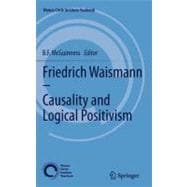
| Editorial | p. 7 |
| Friedrich Waismann - Causality and Logical Positivism | |
| Waismann: the Wandering Scholar | p. 9 |
| Tributes to and Impressions of Friedrich Waismann | p. 17 |
| Waismann's Lectures on Causality: An Introduction | p. 31 |
| The Decline and Fall of Causality | p. 53 |
| Causality | p. 91 |
| The Logical Force of Expressions | p. 185 |
| A Philosopher Looks at Kafka | p. 197 |
| Waismann Versus Ewing on Causality | p. 207 |
| Waismann as Spokesman for Wittgenstein | p. 225 |
| Waismann's Testimony of Wittgenstein's Fresh Starts in 1931-35 | p. 243 |
| General Part | |
| Report/Documentation | |
| Otto Neurath's 'Encyclopedia of the World War': A Contextualisation | p. 267 |
| Review Essays | |
| One Hundred Years of Philosophy of Science: The View from Munich | p. 297 |
| Two Recent Trilogies on Ernst Mach | p. 311 |
| Logical Syntax and the Application of Mathematics | p. 323 |
| Reviews | |
| Une histoire compareée de la philosophie des sciences, Volume I: Aux sources du Cercle de Vienne, Volume II: L'empirisme logique en débat, Les Presses de l'université Laval, Québec (Canada) 2010 | p. 337 |
| 2002, Wienin piiri, Helsinki: Gaudeamus | p. 338 |
| Empiricism at the Crossroads. The Vienna Circle's Protocol-Sentence Debate. Open Court, Chicago, III. 2007 | p. 342 |
| The Cambridge Companion to Carnap, edited by Michael Friedman and Richard Creath, Cambridge University Press, 2007 | p. 346 |
| Obituary: Stephen Toulmin (1922-2009) | p. 351 |
| Activities of the Vienna Circle Institute | p. 359 |
| Index of Names | p. 365 |
| Table of Contents provided by Ingram. All Rights Reserved. |
The New copy of this book will include any supplemental materials advertised. Please check the title of the book to determine if it should include any access cards, study guides, lab manuals, CDs, etc.
The Used, Rental and eBook copies of this book are not guaranteed to include any supplemental materials. Typically, only the book itself is included. This is true even if the title states it includes any access cards, study guides, lab manuals, CDs, etc.